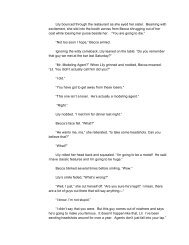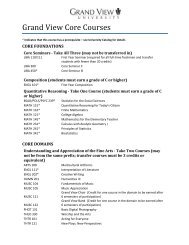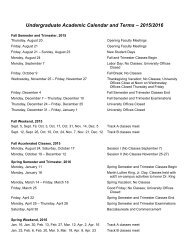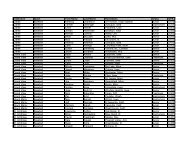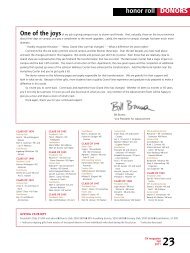MUNINN
MUNINN - Grand View University
MUNINN - Grand View University
- No tags were found...
You also want an ePaper? Increase the reach of your titles
YUMPU automatically turns print PDFs into web optimized ePapers that Google loves.
Lincoln v. Douglas <strong>MUNINN</strong> Volume 2 (2013)Douglas once again went on to accuse Lincoln of favoring racialequality, which Lincoln denied. He used this opportunity to state hisstance on racial equality saying: “I say to you in all frankness,gentlemen, that in my opinion a Negro is not a citizen, cannot be, andought not to be, under the constitution of the United States.” 56 InLincoln’s rebuttal, he used his time to deny the accusations madeagainst him by Douglas. Lincoln responded to the allegation that heconspired with Trumbull to rid the old parties with: “I have twice toldJudge Douglas to his face that from beginning to end there is not oneword of truth in it.” 57 He further denied his favoritism towards racialequality and offered a correction that he did not vote against troopsupplies for the Mexican War—which Douglas had accused him of inhis speech. 58 Like the previous three debates, assessments differedgreatly among newspapers in the area. The Weekly North-WesternGazette noted that “Douglas has changed front so often that the peoplecannot place any reliance upon him.” 59 A similar reaction came fromthe Prairie Beacon News, which noted in their paper: “At theconclusion of the rejoinder, the applause was so great that there was nomistaking the fact that an overwhelming majority of that large audiencewere for Lincoln.” 60Less than a month later, the fifth debate took place inGalesburg, a Republican stronghold, in front of approximately fifteento twenty thousand individuals, which was the largest crowd yet. 61 Inhis opening statement, Douglas used the beginning of his time to againannounce that the Republican Party was a sectional party. “But nowyou have a sectional organization, a party which appeals to the northernsection of the Union…[in the] hope that they will be able to unite thenorthern States in one great sectional party.” 62 Once again, Douglasannounced that Lincoln, and the Republican Party, were for racialequality, and that Lincoln had said one thing in the northern part of thestate and another in the southern part: “[I]n one part of the State hestood up for negro equality, and in another part for political effect,56Lincoln, 673.57Lincoln, 678. Editor’s note: Since the Democratic and former Whig parties both hadNorthern and Southern factions, Douglas’ accusation is that Lincoln’s Republican party isattempting to destroy their opponents by using slavery as a sectional issue merely to winthe election.58Guelzo, Lincoln and Douglas , 203.59H. H. Houghton, “The Charleston Debate,” Weekly North-Western Gazette ,September28, 1858, Galena, Illinois, in NIU Libraries Digitization Projects, lincoln.lib.niu.edu/cgibin/philologic/getobject.pl?c.2592:1.lincoln(accessed June 7, 2013).60John T. Morton, “Lincoln and Douglas at Charleston,” Quincy Daily Whig andRepublican, September 23, 1858, Quincy, Illinois, in NIU Libraries DigitizationProjects, lincoln.lib.niu.edu/cgi-bin/philologic/getobject.pl?c.2513:1.lincoln (accessedJune 7, 2013).61Zarefsky, 62.62Lincoln, 693.21



